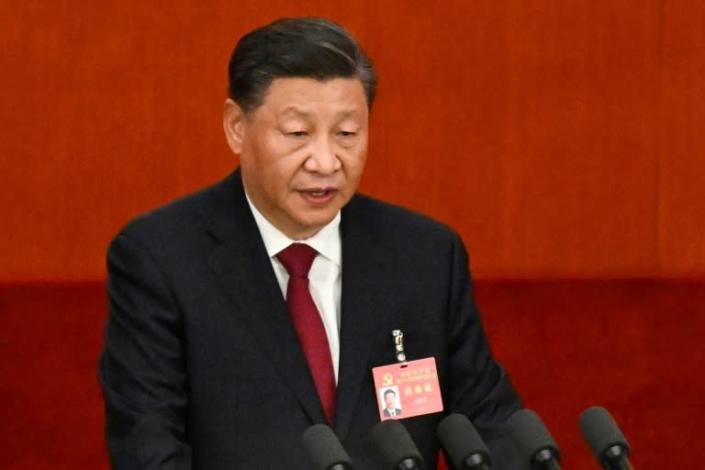
President Xi Jinping kicked off China’s five-yearly Communist Party Congress on Sunday with a wide-ranging speech defending Beijing’s zero-Covid approach, hailing its anti-graft efforts and reasserting its ambition to absorb Taiwan by force if necessary.
The speech gave Xi an opportunity to tout his government’s achievements to the conclave’s roughly 2,300 delegates, ahead of being handed an expected third term in power at the end of the week.
AFP gives a rundown of key takeaways from Xi’s opening address:
– ‘Critical moment’ –
Xi took the stage at Beijing’s Great Hall of the People to thunderous applause, beginning his speech by hailing the Communist Party’s rule and noting that the gathering came at a crucial time.
“The 20th National Congress of the Communist Party of China is a very important congress convened at a critical moment,” Xi said.
– Putting ‘lives first’ –
After weathering months of criticism over the effects of his country’s strict zero-Covid policy, Xi said China had put “the people and their lives first” when dealing with the pandemic.
He said China had “protected people’s safety and health to the highest degree and achieved significant positive results in coordinating epidemic prevention and control with social and economic development”.
Xi gave no sign that the rigid policy — which has forced millions into lockdowns over just handfuls of cases as the rest of the world learns to live with the virus — would relent anytime soon.
– Hong Kong and Taiwan –
China’s increasing assertiveness in the Taiwan Strait, as well as its moves to snuff out dissent in Hong Kong following pro-democracy protests in 2019, have drawn pointed critiques from Western governments.
But Xi on Sunday hailed the end of what he described as the “chaos” in Hong Kong, while condemning “external forces” interfering in self-ruled Taiwan, which China claims as its own.
“The situation in Hong Kong has achieved a major transition from chaos to governance,” he said, going on to pledge a “major struggle against separatism and interference” in Taiwan.
He later added that “the Taiwan issue… must be resolved by Chinese people alone”.
“We… will never commit to abandoning the use of force, and reserve the option to take all necessary measures,” Xi said in remarks greeted by thunderous applause.
– Anti-graft drive –
Xi told delegates that his long-running crackdown on corruption had put an end to “serious latent dangers” within the Communist Party, military and the state.
“The fight against corruption has won an overwhelming victory and has been comprehensively consolidated, eliminating serious latent dangers within the party, the state and the military,” he said, referencing a campaign critics say has been used to curb internal dissent.
– Climate fight –
The Chinese president also vowed that Beijing was committed to the global fight against climate change.
China will “actively participate in global governance on climate change”, Xi told delegates, committing to carbon emissions reduction while promising to “strengthen the clean and efficient use of coal”.
Despite vowing to reduce coal use from 2026 as part of a broad set of climate promises, Beijing has stepped up spending on the fossil fuel in the face of extreme weather, a domestic energy crunch and rising global fuel prices — raising concerns its policies may hinder the fight against climate change.
– ‘Cold War mentality’ –
Xi said Beijing opposed a “Cold War mentality” in international diplomacy, but made no mention of frayed relations with the United States.
“China… resolutely opposes all forms of hegemony and power politics, opposes the Cold War mentality, opposes interfering in other countries’ domestic politics, opposes double standards,” he said, claiming Beijing “will never seek hegemony and will never engage in expansion”.
– Things left unsaid –
While the Chinese leader’s speech referenced the fraught international climate, he notably made no mention of Russia’s invasion of Ukraine or the major ripple effects the conflict has had on the global economy.
He also made no reference to the situation in China’s western region of Xinjiang, where Beijing stands accused of widespread human rights abuses and detaining over a million Uyghur and other Muslim minorities in re-education camps.
Nor did his speech touch on the unprecedented crisis in China’s real estate sector, where cash-strapped, debt-laden developers have seen sales plummet and confidence dashed in the housing market.
smw-oho/axn




